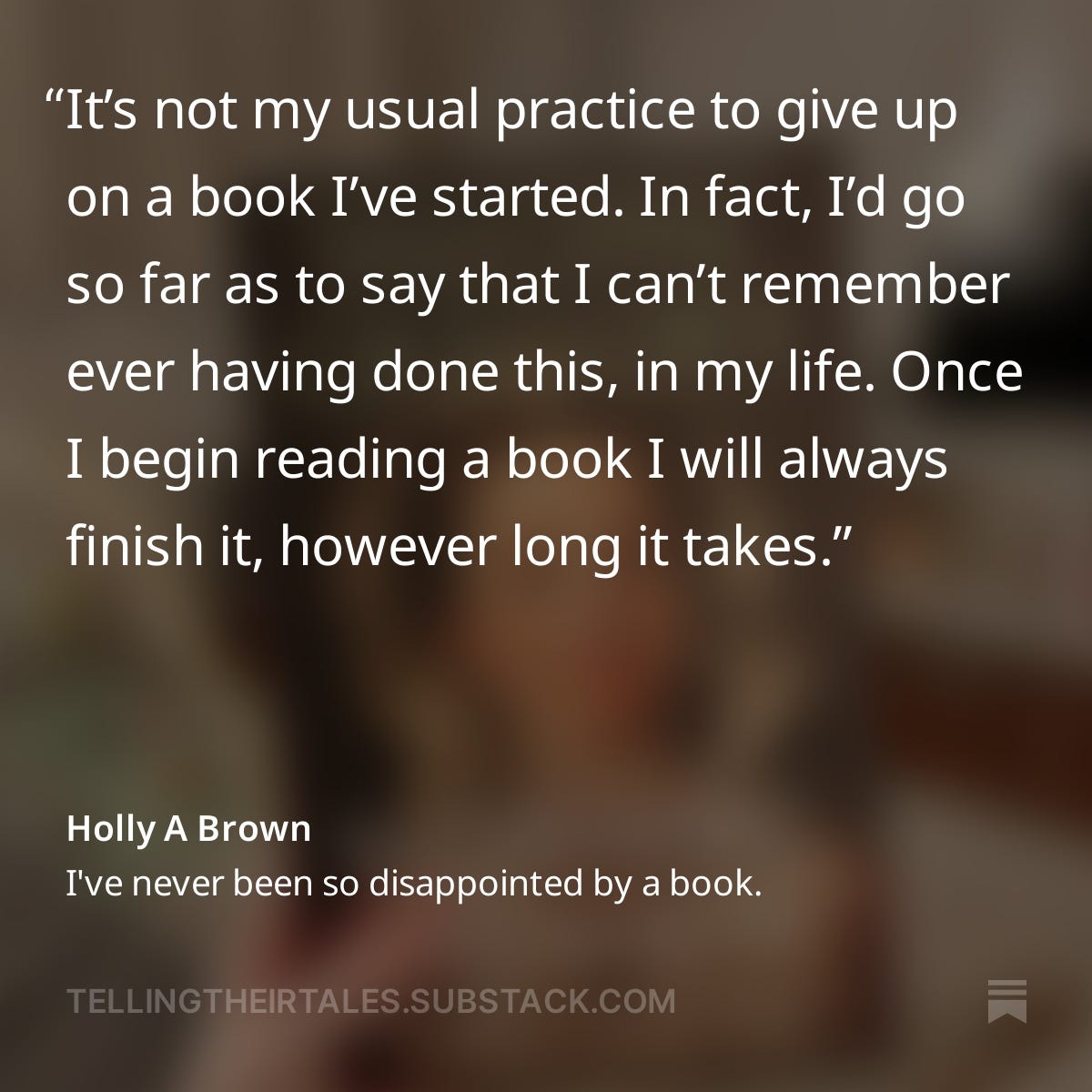I nearly DNF'd this book - and I'm so glad I didn't
Book Review | 'Glorious Exploits' by Ferdia Lennon
At the start of 2024, I wrote that I had once been a proud ‘always finisher’ of books. Never one to be defeated, I took pride in keeping going even when I’d decided that a book was not for me. I just couldn’t face putting a book back on its shelf half-read.
Then, I came across a book touted as a ‘radical retelling’ of England’s history that was such a disappointment that I found myself cured of this ‘always finishing’ disease (you can read more about that book HERE). By April, I’d given up on three books. Three books!
And Glorious Exploits by Ferdia Lennon nearly succumbed to the same fate.
Nearly but, thankfully, not quite.
I was due to write a review for a different book this afternoon, but I was so blown away by a late-stage plot twist when reading Glorious Exploits last night that I simply had to share it. The reflections I’ll share here are straight from the heart: unusually for me, there has been no mindmap, no plan, no careful weeks of thinking. Nope, this review is a right-in-the-moment one, borne from the sheer joy of having my expectations overturned.
Before we dive in, please be assured: there are no spoilers here! That’s not my jam. I’ll give enough detail to whet your appetite without giving away any of the tension that builds throughout the book.
I first shared Glorious Exploits a little over a month ago.
It had just won the Waterstones Debut Fiction Prize and I happened to be in the market for a fiction read after straying from my usual non-fiction books over the summer months. The fact that a historical fiction book had won a prize really caught my attention as I think the genre doesn’t always have the best reputation. With the market so saturated with bodice-ripping 18/19th-century romances, it can be hard to find high-quality, well-written and well-researched historical fiction novels that are actually good to read.
I had high hopes for this one.
Here’s what the blurb promises:
‘It’s 412BC and Athens’ invasion of Sicily has failed catastrophically. Thousands of Athenian soldiers are held captive in the quarries of Syracuse; starving, dejected and hanging on by the slimmest of threads.
‘Lampo and Gelon are local potters, young men with no work and barely two obols to rub together. With not much to fill their time, they take to visiting the nearby quarry, where they discover prisoners who will, in desperation, recite lines from the plays of Euripedes in return for scraps of bread and a scattering of olives.
‘And so an idea is born: the men will put on Medea in the quarry. A proper performance to be sung of down the ages. Because, after all, you can hate the Athenians for invading your territory, but still love their poetry.
‘But as the performance draws near and the audacity of their enterprise dawns on them, it becomes difficult to distinguish between enemies and friends. And Lampo, whose ambitions have stretched beyond having enough coin for the next jug of wine, finds his aspirations elevated, his heart entangled and his courage tested in ways he could never have imagined.’
Long-time readers of
will know that I am an early medievallist at heart, with my area of interest and expertise being England c. A.D. 550-800. The Mediterranean in the fifth century B.C. is quite a long way from that! But I was intrigued by this writing that had won a debut fiction prize, and realising that there is not a huge amount of fiction set within my time period, I decided to widen my horizons a little.Initially, I loved it.
The style of writing is quite unique, told from the first person perspective of Lampo, a cheeky chappy with a bit of a swagger to him. I imagine him to be a little like Del Boy (of Only Fools and Horses fame): a bit of a charmer, a bit of an aspiring (yet comically failing) entrepreneur, a bit of a lad. It took a while to get used to (especially the way Lennon has him saying ‘says I’ instead of ‘I said’ or an equivalent), but perhaps this is only because I am used to more stereotypically historical fiction characters.
We journey with Lampo through the highs and lows of Syracusan life following the failed Athenian invasion, hearing stories of both protagonists’ hardships as a result. He and Gelon, his best friend, rally up a group of Athenian prisoners, kept captive in an abandoned quarry, and appoint themselves directors. They run auditions, organise rehearsals - even commission sets and costumes from the top shop on the island.
And this is where it started to get a bit… dull.
I so wanted to love it.
But it became quite uneventful. Nothing was happening. Each chapter felt very same-y, with Lampo and Gelon preparing for the performance and having their ongoing worries about nobody turning up. There are a few sidebars with a budding romance and a weird/suspicious financial backer, which might have been threads coming to fruition later on, but these don’t really build throughout the middle section in the way you might expect them to if they are going to become focal points of tension.
And so I’d all but decided to abandon the book. Return it to the growing shelf of books I’d DNF’d.1 Start something new.2
Being so close to the end (80 pages or so), I thought I might as well press on to the end, being potentially only a couple of nights' worth of pre-bed reading.
And then BAM! The most dramatic, most unexpected plot twist I have ever read.
Perhaps the more discerning reader might have seen it coming.3 Perhaps the slightly dull middle of the book was intentional, a red herring drawing the reader away from any sense of what is about to come.
Either way, you can bet I read way past my bedtime last night. And, with just a few chapters left, I will most certainly be finishing this book.
I’d highly encourage you to give it a chance, too. You can buy it HERE. Not an affiliate link, just one bookworm helping out others.
I hope you enjoy it as much as I have, now, by the end: I have been utterly transformed from sceptic to evangelist. And though I won’t share ay more about the plot twist that changed my mind, I will say that it has totally, totally redeemed the book for me.
That’s all for this review, but I’d love to hear your thoughts in the comments if you’ve read Glorious Exploits or are now planning to read it - or if you’ve had a similar experience with another book!
Become a subscriber to make sure you don’t miss out on more posts like this one.
Are you a reader or writer of history or historical fiction?
Join the Society of History Writers!
DNF = Did Not Finish. Usually used in a sporting context, for example if a runner does not complete their race. Thankfully, in my mountain ultra running adventures I have never once DNF’d, though I came perilously close 500m from the end of the Scafell Pike Trail Marathon due to cramp. I am, however, collecting quite a few book DNFs…
I am also a chronic starter of books, with usually four or five on the go. I just get too excited by all the new (or new-to-me) books that I can’t wait to start them. It’s something I’m trying to work on…
Those of us not deep in the trenches of newly-walking-toddler-mum life, for example…









Getting ready to see a new production of Shakespeare's Comedy of Errors, and having played a Greek courtesan (with a scandalous costume malfunction on opening night) in The Boys from Syracuse in the Rodgers and Hart musical adaptation of same back-in-the day, you've inspired me to check out this book, Holly--something very meta to me about this book about a play in "dear old Syracuse!"
Ah - forgot to say - I like your style of book review here. You should do more off the cuff ones...